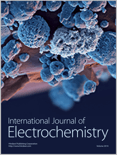
International Journal of Electrochemistry
Scope & Guideline
Unlocking the potential of electrochemical systems for a sustainable future.
Introduction
Aims and Scopes
- Electrochemical Energy Storage:
Research on materials and systems for energy storage, such as batteries and supercapacitors, emphasizing innovations in electrode materials and electrolytes. - Electrochemical Sensors and Detection:
Development of advanced sensors for detecting chemical species, pollutants, and biomolecules using electrochemical methods, with a focus on improving sensitivity and selectivity. - Electrocatalysis and Reaction Mechanisms:
Investigation of electrocatalytic processes, including oxidation and reduction reactions, aimed at enhancing performance and understanding underlying mechanisms in various electrochemical systems. - Material Science in Electrochemistry:
Exploration of new materials, including nanostructured and composite materials, for improving electrochemical performance in various applications. - Environmental Electrochemistry:
Studies focused on using electrochemical methods for environmental monitoring and remediation, including the detection of heavy metals and organic pollutants.
Trending and Emerging
- Nanomaterials in Electrochemistry:
There is a growing trend towards the use of nanostructured materials, such as carbon nanotubes and metal nanoparticles, which enhance the performance of electrochemical sensors and energy storage devices. - Solid Polymer Electrolytes:
Increasing attention is being paid to solid polymer electrolytes, particularly in the context of supercapacitors and batteries, highlighting the importance of developing new materials for better ionic conductivity and stability. - Electrochemical Detection of Pharmaceuticals and Contaminants:
Emerging research focuses on the detection of trace amounts of pharmaceuticals and environmental contaminants, reflecting a heightened awareness of public health and environmental safety. - Sodium-Ion Battery Technology:
Research on sodium-ion batteries is gaining momentum, driven by the search for alternative energy storage solutions that are more sustainable and cost-effective compared to lithium-ion technologies.
Declining or Waning
- Traditional Electrochemical Techniques:
There has been a noticeable decrease in publications focusing solely on traditional electrochemical methods, as researchers increasingly explore novel materials and integrated systems that enhance electrochemical performance. - Basic Electrochemical Theory:
Papers centered on fundamental theoretical aspects of electrochemistry are becoming less common, as the journal shifts towards more application-driven research that demonstrates practical implications. - Low-Complexity Sensor Designs:
Research on simpler, less sophisticated sensor designs is declining, with a stronger emphasis now placed on high-performance, complex sensor systems that utilize advanced materials and technologies.
Similar Journals
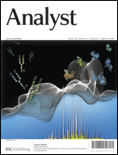
ANALYST
Elevating Knowledge in the Heart of Chemical ResearchANALYST, published by the Royal Society of Chemistry, stands as a prestigious journal in the fields of Analytical Chemistry, Biochemistry, Electrochemistry, Environmental Chemistry, and Spectroscopy. Esteemed for its rigorous peer-review process and influential contributions to the advancement of scientific knowledge, the journal has been a vital resource for researchers and professionals since its inception in 1876. With an impressive Scopus ranking that places it in the top quartile for several chemical disciplines, it specifically ranks #12 in Spectroscopy and #31 in Analytical Chemistry, reflecting its robustness and relevance in the analytical sciences. Though currently not an Open Access publication, ANALYST provides valuable insights and cutting-edge research that help drive innovation and discovery in various scientific realms. Researchers and students alike will benefit from its commitment to disseminating high-quality research that addresses contemporary challenges and promotes interdisciplinary collaboration.

Electrochemical Science Advances
Driving Progress in Electrochemical ApplicationsElectrochemical Science Advances, published by WILEY, is an esteemed Open Access journal that has been making significant contributions to the field of electrochemistry since its inception in 2021. With an ISSN of 2698-5977, this journal serves as a vital platform for researchers and practitioners looking to disseminate their findings on a diverse range of topics within the electrochemical sciences and related areas. The journal has achieved commendable rankings in the Scopus database, placing it in the 2nd quartile in Chemistry (miscellaneous) and the 3rd quartile in Electrochemistry, highlighting its relevance and growing influence in the academic community. As it converges from 2021 to 2024, Electrochemical Science Advances aims to foster collaboration and innovation, offering a vital resource for students, professionals, and researchers dedicated to advancing knowledge and technology in electrochemistry. Access to this cutting-edge research is straightforward, allowing for a comprehensive engagement with the latest advances in the field.

SURFACE ENGINEERING AND APPLIED ELECTROCHEMISTRY
Fostering Global Dialogue in Surface EngineeringSURFACE ENGINEERING AND APPLIED ELECTROCHEMISTRY, published by PLEIADES PUBLISHING INC, stands as a pivotal resource in the realms of engineering and materials science. With an ISSN of 1068-3755 and an E-ISSN of 1934-8002, this journal encompasses an extensive scope that includes industrial applications, and innovative surface treatments, fostering advancements in the fields of Industrial and Manufacturing Engineering, Surfaces, Coatings and Films, and Surfaces and Interfaces. Recognized for its contributions, it currently holds a Q3 classification in both Industrial and Manufacturing Engineering and Surfaces, Coatings and Films, alongside a Q4 ranking in Surfaces and Interfaces for the year 2023. Despite its competitive standings, the journal encourages inclusive dialogue and dissemination of research from a global community—making it an essential platform for researchers and professionals dedicated to surface technologies and applied electrochemistry. Potential contributors and readers can expect a comprehensive exploration of techniques and innovations, reinforcing the journal's commitment to bridging theory and practical application in these dynamic fields.
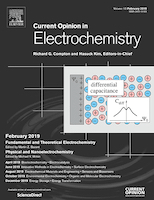
Current Opinion in Electrochemistry
Shaping the Future of Electrochemical ResearchCurrent Opinion in Electrochemistry, published by Elsevier, stands at the forefront of research in the fields of Analytical Chemistry and Electrochemistry. With an impressive Impact Factor reflected in its Q1 quartile rankings for both categories, this journal holds a significant place among its peers, ranking 9th in Analytical Chemistry and 8th in Electrochemistry according to Scopus metrics. Launched in 2017, it has rapidly become a vital platform for the dissemination of cutting-edge insights, reviews, and critical assessments that shape the future directions of electrochemical research and applications. As researchers, professionals, and students engage with its content, they find not only a repository of knowledge but also a source of inspiration for innovative experiments and applications. Readers can explore the wealth of information this journal provides to stay updated with contemporary trends and emerging technologies in electrochemistry. With a commitment to high-quality scholarly content, Current Opinion in Electrochemistry is your essential guide to the evolving landscape of electrochemical science.
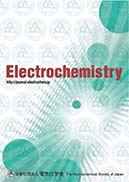
ELECTROCHEMISTRY
Fostering Collaboration in Electrochemical ResearchELECTROCHEMISTRY is an esteemed journal published by the Electrochemical Society of Japan, dedicated to advancing the field of electrochemical science and technology. With an ISSN of 1344-3542 and an E-ISSN of 2186-2451, this journal has been providing a platform for scholarly communication since its inception in 1996, with a converged scope extending to 2024. As an Open Access publication since 2020, it facilitates the wide dissemination of research, fostering collaboration among researchers, professionals, and students alike. Currently positioned in Q3 of the electrochemistry category and ranking 52 out of 60 in Scopus, ELECTROCHEMISTRY is committed to publishing high-quality, peer-reviewed articles that explore novel electrochemical systems, applications, and methodologies. With its base in Tokyo, Japan, the journal serves a global audience, promoting cutting-edge research that drives innovation in energy, materials science, and analytical chemistry.
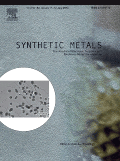
SYNTHETIC METALS
Pioneering Research in Condensed Matter Physics.SYNTHETIC METALS is a leading academic journal published by Elsevier Science SA, focusing on the interdisciplinary field of materials science with an emphasis on the development and application of synthetic metallic materials. Established in 1979, this esteemed journal offers a platform for innovative research that promotes advancements in condensed matter physics, electronic materials, materials chemistry, and mechanical engineering. With an impressive Q1 ranking in Metals and Alloys and Q2 rankings across various other categories, SYNTHETIC METALS serves as a vital resource for researchers, professionals, and students seeking to explore complex material systems and their applications in industry. Although it does not currently offer open access, the journal's impact is highlighted by its robust Scopus rankings, ensuring high visibility and dissemination of meaningful research outcomes. As it progresses through its convergence period to 2024, SYNTHETIC METALS remains dedicated to advancing knowledge and fostering scientific inquiry in the field of materials science.

Advanced Science
Empowering Global Research Through Open AccessAdvanced Science, published by Wiley, stands as a premier open-access journal since 2014, dedicated to fostering innovative research and insights across multiple disciplines including Biochemistry, Genetics and Molecular Biology, Chemical Engineering, Engineering, Materials Science, Medicine, and Physics and Astronomy. Based in Germany, this journal has quickly established itself in the academic community, receiving high recognition with a Q1 ranking in its respective categories as of 2023. With its impressive Scopus rankings, including #1 in Biochemistry, Genetics and Molecular Biology and #3 in General Engineering, Advanced Science plays a pivotal role in disseminating groundbreaking scientific knowledge to researchers, professionals, and students alike. By embracing an open access model, it ensures that high-quality research is readily available to a global audience, thus facilitating advancements in science and engineering fields.
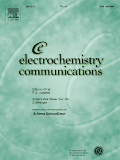
ELECTROCHEMISTRY COMMUNICATIONS
Bridging Theory and Practice in Electrochemical ResearchELECTROCHEMISTRY COMMUNICATIONS, published by ELSEVIER SCIENCE INC, is a leading journal in the field of electrochemistry, holding a prestigious position in the Q1 quartile since 2023. With an impact factor reflecting its esteemed reputation, the journal ranks #15 out of 60 in the Scopus Chemistry category for Electrochemistry, placing it in the 75th percentile. Since adopting an Open Access model in 2019, it has garnered widespread visibility and accessibility, enabling researchers and professionals to share groundbreaking findings and foster innovation. Covering a wide range of topics from fundamental electrochemical research to practical applications, ELECTROCHEMISTRY COMMUNICATIONS serves as a critical platform for disseminating knowledge and advancing the field. The journal's commitment to quality and relevance positions it as a vital resource for academics and practitioners striving to stay at the forefront of electrochemical science.

Analytical & Bioanalytical Electrochemistry
Advancing the Frontiers of Electrochemical ResearchAnalytical & Bioanalytical Electrochemistry is a pivotal journal dedicated to the advancement of research and innovation in the fields of analytical chemistry and electrochemistry. Published by the University of Tehran, Faculty of Chemistry, Center of Excellence in Electrochemistry, this journal has been contributing to the scientific community since its inception in 2009 and continues to be a critical platform through 2024. With an ISSN of 2008-4226, it focuses on a variety of topics including electrochemical sensors, bioanalytical techniques, and innovative methodologies in electrochemical analysis. Although it currently holds a Q4 quartile ranking in both analytical chemistry and electrochemistry categories, its unique insights and research findings are essential for advancing knowledge and fostering interdisciplinary collaboration within the scientific community. Researchers, professionals, and students engaged in these dynamic fields will find valuable resources and contribute to the ongoing discourse by publishing their work in this journal. We invite you to explore and engage with the diverse content that Analytical & Bioanalytical Electrochemistry offers to enhance your research and professional development.

Journal of the Korean Electrochemical Society
Catalyzing Collaboration in the Electrochemical CommunityJournal of the Korean Electrochemical Society (ISSN: 1229-1935, E-ISSN: 1229-1935) stands as a prominent publication in the rapidly evolving field of electrochemistry. Published by the prestigious Korean Electrochemical Society, this journal serves as a vital platform for researchers, professionals, and students eager to disseminate and access cutting-edge studies related to electrochemical processes, materials, and technologies. With an emphasis on promoting innovative research and practical applications, the journal aims to foster collaboration and knowledge exchange within the global electrochemistry community. Although not an open access journal, it provides comprehensive and rigorous peer-reviewed content that ensures the highest scientific quality, making it a valuable resource for anyone involved in the field. Located in Seoul, South Korea, it continues to contribute significantly to the advancement of electrochemical sciences, addressing key challenges and developments that shape the future of technology and environmental sustainability.